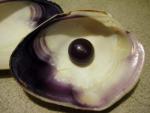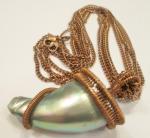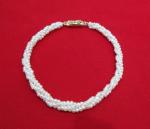Pearl Centaur at Abu Dhabi Hotel
by Nathalie Farah, Staff Reporter
(Gulf News)
Pearl Centaur at Abu Dhabi Hotel...
The 856.58-carat (171.3 gram) nacreous baroque pearl sits secured in the antique gold sculptured torso of a centaur, a half-man, half-horse creature of Greek mythology.
Abu Dhabi: One of the world's largest pearls will be exhibited at the Emirates Palace Hotel in the UAE capital.
The 856.58-carat (171.3 gram) nacreous baroque pearl sits secured in the antique gold sculptured torso of a centaur, a half-man, half-horse creature of Greek mythology. At 10.2 cm long and with a circumference of 15.2cm, it is almost twice as large as the Hope pearl, which is displayed at the British Museum of Natural History, and almost 11 carats heavier than the Burma pearl.
And now, the formerly untitled pearl has a name, Danat Shaikha Fatima Bint Mubarak, the Mother of the Nation. It will be showcased alongside pearls from all over the world and throughout history, in a permanent exhibition entitled the Natural Pearl Display at the Emirates Palace Hotel.
"Pearls are an integral part of the UAE's culture and heritage and for generations have provided a source of wealth in the emirates. Long before the discovery of oil, the UAE's pearl trade was vital in helping to establish Abu Dhabi as an important trading port," Khalid Al Sayegh, Chairman of the Pearl Revival Committee (PRC), said yesterday at a press conference.
"It's a fascinating, organic gemstone… you can put a pearl in the palm of your hand, observe it and let it talk to you," Bell said. "I've been coming to this region for 20 years, not only to look for pearls
The PRC has also established a partnership with the Gemological Institute of America (GIA), a non-profit organization that tests precious and semi-precious stones as well as pearls. "Pearls are the least understood gemstones in the world. Many assume that all pearls in the market are natural, when in fact only a small per cent are, while the rest are cultured," said Thomas M. Moses, Senior Vice-President, Laboratory and Research, GIA.
Test
To test whether a pearl is authentic or fake, rub it very gently against the back of your teeth. If it is genuine, you will feel a gritty sensation but if it's fake, it will feel smooth!
To learn more about the Pearl Revival Committee, visit www.pearlrevivalcommittee.com
Classification: Seven value factors
According to the Gemological Institute of America (GIA), the description and classification of (grade) pearls can be based on seven Value Factors:
Size: weight in carats or grains, measurements (diameter or length/width/depth) in millimetres.
Shape: Round, Near-round, Drop, Oval, Button, Semi-baroque, and Baroque.
Colour: based on hue (colour impression), tone (light or dark) and saturation (strength of colour).
Lustre: describes the intensity and sharpness with which light is reflected from the surface.
Surface: describes the condition (degree of spotting) on the surface.
Matching: describes the uniformity of the pearls in a pair, group or strand.
Nacre thickness: Measurement in millimetres of an individual or multiple pearls.
Thank you to Gulf News for permission to use this photo and article about the Pearl Centaur at Abu Dhabi Hotel.
Join in and write your own page! It's easy to do. How? Simply click here to return to Baroque.





